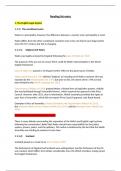Reading list notes
1. The English Legal System
1.1.1) The constituent parts
Wales is a principality, however, the difference between a country and a principality is moot.
Wales differs from the other constituent countries since it has not had its own legal system
since the 16th century, but this is changing.
1.1.1.1) England and Wales
Wales was legally annexed by England following the Laws of Wales Act 1535
The purpose of the act was to ensure there could be Welsh representation in the (then)
English Parliament.
Laws of Wales Act passed in 1543 gave further effect to the governance of Wales.
Wales and Berwick Act 1746 defined ‘England’ as including all of Wales, however, this was
repealed by the Interpretation Act 1978, but prior to this, the extent of the 1746 act had
been limited by the Welsh Language Act 1967.
Government of Wales Act 2006 granted Wales a limited form of legislative powers. Initially
this was facilitated through ‘Assembly Powers’, which required the approval of the Privy
Council. However, after 2011, due to referendum, Welsh assembly permitted the rights to
pass ‘Acts of Assembly’, which did not require Privy Council approval, only Royal Assent
Examples of Acts of Assembly: Schools Standards and Organisation (Wales) Act 2013,
the National Health Service Finance (Wales) Act 2014, and the Renting Homes (Wales) Act
2016.
Ask about the section pertaining to Covid
There is some debate surrounding the separation of the Welsh and English Legal systems
following the commission’s belief that Wales should have responsibility for the justice
system, prisons, police, and the judiciary. This notion is bolstered by the fact that the Welsh
Assembly was starting to produce its own laws.
1.1.1.2) Scotland
Scotland joined as a result of an Act of Union (1707)
The Parliaments of England and Scotland were extinguished, and the Parliament of the UK
was created, which differs from Wales considerably since the Welsh members simply joined
the English Parliament.
, The Act of Union preserved the Scots law (Title 19), meaning that there is no automatic
assumption that laws passed will extend to Scotland.
The question of Scottish independence looms and was accelerated by the appointment of
the Scottish National Party by a clear majority in 2011.
Despite the referendum concluding that 55% of voters do not want Scottish independence,
the issue remains a controversial one; this was catalysed by the withdrawal of the UK from
the EU.
To bypass the need for Westminster consent to hold a referendum, the Scottish government
sought to hold a non-binding vote. This would mean that, politically at least, it would be
difficult for Westminster to ignore a majority vote.
The legality of such a vote was questioned by the Scottish government.
Westminster argued there was no justification for the case.
Supreme Court held that the Scottish government did not have the legislative power
to hold the planned referendum.
The reason for this was that it was difficult to argue that the withdrawal of Scotland
from the UK did not relate to a reserved matter.
Politically, it is beneficial for a National Party to have a Supreme Court judgement to
help explain their inaction regarding Scottish independence.
1.1.1.3) Northern Ireland
NI is the most recent addition to the UK, having been created in 1920.
Before 1920, Ireland as a whole country, was a member of the UK as a result of the Act of
Union 1801. Under this Act, Ireland did not become part of the United Kingdom of Great
Britain but rather transformed into a new body.
Ireland retained its own legal status like Scotland, although there were UK laws; at the same
time however, there were individual Irish laws.
Pressure grew for Ireland to have more control over its own affairs. This was in response to
injustices carried out by the British.
Government of Ireland Act 1920 led to the partition of Ireland. However, this was repealed
by the Northern Ireland Act 1998. Links to Good Friday agreement.
The government of NI is unique within the UK since it is based on power-sharing.
1.2.1.1) Substantive or Procedural
Hart: the law can be classified into primary and secondary rules
Primary: laws that set out rights, duties, and obligations.





